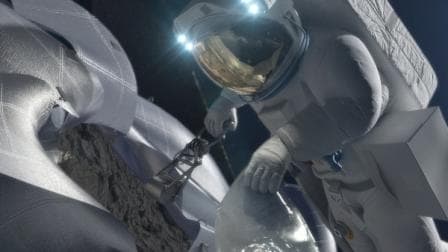NASA Releases Detailed Schedule For Its Asteroid Redirect Mission
The National Aeronautics and Space Administration agency of the United States has announced details of its Asteroid Redirect Mission. In this mission NASA hopes to capture an asteroid with help of a robotic spacecraft and send it to a stable orbit around the moon. Once the asteroid starts orbiting the moon it shall send astronauts dressed in <a href="https://www.crazyengineers.com/threads/nasa-testing-modified-spacesuit-for-asteroid-mission.72185">NASA Testing Modified Spacesuit For Asteroid Mission</a> to conduct more experiments. NASA will seek assistance from the general public to help them locate an appropriate asteroid in the years leading up to 2018. The only criteria for the selecting the asteroid is size. The asteroid should be less than 32 feet in size.

Concept Image Shows An Astronaut Retrieving A Sample From The Captured Asteroid
NASA is currently working on two concepts for this mission one which will take a chunk out a bigger asteroid and the other which shall capture a small one. In this year itself NASA will take a decision on which design out of the two will be feasible. The spacecraft for the Asteroid Redirect Mission shall be launched in the year 2019. Astronauts however will be allowed to conduct experiments in the year 2020. So why is NASA engaging in this venture? The answer is simple, the asteroid mission will help NASA test all its new technologies before they are put to use in the mars mission of 2030s where humans shall be sent to the red planet.
So the timeline is now set, are you excited? Let us know your views in the comment section below.
Image & News Courtesy: <a href="https://www.nasa.gov/press/2014/june/nasa-announces-latest-progress-upcoming-milestones-in-hunt-for-asteroids/#.U6ZzTUCftcN" target="_blank" rel="nofollow noopener noreferrer">NASA Announces Latest Progress, Upcoming Milestones in Hunt for Asteroids | NASA</a>

Concept Image Shows An Astronaut Retrieving A Sample From The Captured Asteroid
NASA is currently working on two concepts for this mission one which will take a chunk out a bigger asteroid and the other which shall capture a small one. In this year itself NASA will take a decision on which design out of the two will be feasible. The spacecraft for the Asteroid Redirect Mission shall be launched in the year 2019. Astronauts however will be allowed to conduct experiments in the year 2020. So why is NASA engaging in this venture? The answer is simple, the asteroid mission will help NASA test all its new technologies before they are put to use in the mars mission of 2030s where humans shall be sent to the red planet.
So the timeline is now set, are you excited? Let us know your views in the comment section below.
Image & News Courtesy: <a href="https://www.nasa.gov/press/2014/june/nasa-announces-latest-progress-upcoming-milestones-in-hunt-for-asteroids/#.U6ZzTUCftcN" target="_blank" rel="nofollow noopener noreferrer">NASA Announces Latest Progress, Upcoming Milestones in Hunt for Asteroids | NASA</a>
0
